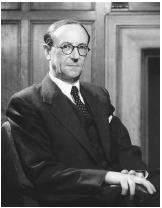James Chadwick
ENGLISH PHYSICIST
1891–1974

Sir James Chadwick was born of humble origins on October 20, 1891, to John Joseph and Anne Mary Chadwick in Clarke Lane just outside of Bollington, England. Primarily raised by his grandparents, he won a scholarship to nearby Victoria University in Manchester, where he entered the physics program by mistake. He had intended to enroll in the mathematics program, but waited in the wrong registration area so ended up being admitted to the physics department instead. Chadwick graduated in 1911 and then went to work in Ernest Rutherford's laboratory, beginning a long, productive relationship between the two men. Chadwick earned his M.S. in 1913; by the age of twenty-one he had already published five scientific papers. At that point, he won an 1851 Exhibition scholarship to study abroad for two years, whereupon he traveled to Germany to work with Hans Geiger.
During his period of study in Germany, Chadwick discovered that β -rays (electrons) are emitted in a continuous spectrum, at odds with other groups' results, and a finding that eventually led to the theory and discovery of the neutrino. While he was in Germany, World War I broke out, and Chadwick was rounded up with other English in the country and interned at Ruhleben.
After his release from Ruhleben in 1919, Chadwick followed Rutherford to the Cavendish Laboratory at Cambridge University, where he was named assistant director of research in 1923. Rutherford had been working on the disintegration of nitrogen nuclei under bombardment by α -particles , and Chadwick's first research upon his return to England involved the disintegration of different nuclei.
It was in the investigation of beryllium disintegration in 1932 that the neutron was discovered. Since the neutron has no charge, the typical electromagnetic methods of detection were useless. Chadwick bounced the mystery particle off atomic nuclei that were detectable, and, by the conservation of momentum and energy, he was able to determine that the neutron had a mass slightly greater than that of a proton.
With the discovery of the neutron as a fundamental particle, many paradoxes of physics and chemistry were finally resolved, and new areas of research evolved. Prior to the discovery of the neutron as a fundamental particle, scientists generally believed that the nucleus was comprised of protons and "nuclear electrons." However, one could not explain, for example, the spin of nuclei with that model. Now, at last, theory could predict the properties of the nucleus quite well. Also, since neutrons are not repelled by the charge on the atomic nucleus, they interact easily with nuclei. Neutron scattering enables the determination of crystal structures by probing the positions of nuclei in a sample. Neutrons can also catalyze fission reactions, for example, the fission of uranium nuclei that led to the creation of nuclear power plants and the atomic bomb.
Only three years after the discovery of the neutron, Chadwick was awarded the Nobel Prize in physics in 1935. He was lured away from Cambridge to accept the chair in physics at Liverpool University, where he oversaw the construction of the first cyclotron in England. As World War II broke out, Chadwick played a prominent role in the effort to create the atomic bomb, both in England, and, beginning in 1943, as the leader of the British effort on the Manhattan Project . Chadwick returned to his chair in Liverpool in 1946, but soon thereafter he accepted an offer from his alma mater, the College of Gonville and Caius at Cambridge, to serve as its master, a post he held until his retirement in 1958. He died in Cambridge on July 24, 1974.
SEE ALSO Beryllium ; Nuclear Chemistry ; Radiation ; Rutherford, Ernest .
Michael J. Fosmire
Bibliography
Brown, Andrew (1997). The Neutron and the Bomb. New York: Oxford University Press.
Internet Resources
Nobel e-Museum. "James Chadwick—Biography." Available from http://www.nobel.se/physics/laureates/1935/chadwick-bio.html .
Comment about this article, ask questions, or add new information about this topic: